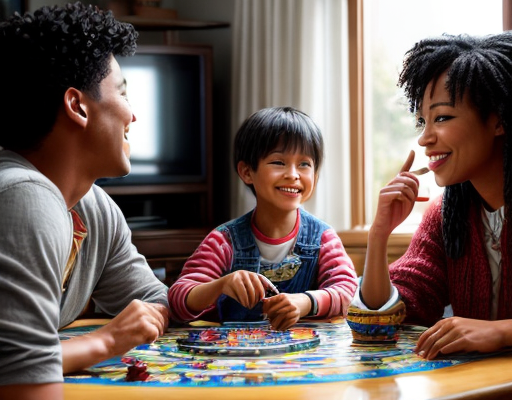
9 Family Games That Celebrate Cultural Diversity
9 Family Games That Celebrate Cultural Diversity
Family game nights are a wonderful way to connect, have fun, and create lasting memories with your loved ones. They provide an opportunity to learn and celebrate different cultures, fostering understanding and appreciation for diversity. In this article, we will explore nine fantastic family games that celebrate cultural diversity and can be enjoyed by people of all ages. From traditional games to modern adaptations, these games will bring your family together and spark conversations about different cultures.
The Importance of Celebrating Cultural Diversity
Cultural diversity is a fundamental aspect of our world, shaping our society, values, and traditions. By celebrating cultural diversity within our family units, we teach our children about the richness of the world and the importance of respecting and understanding different cultures. Family games that focus on cultural diversity encourage empathy, curiosity, and open-mindedness, fostering an inclusive mindset within the family.
Game 1: “Guess Who?” Cultural Edition
A twist on the classic “Guess Who?” game, this cultural edition features faces representing various ethnicities, traditions, and backgrounds. Players ask questions about the cultural traits represented on the cards to guess which character their opponent has selected. This game promotes cultural awareness and encourages players to learn about different customs and traditions.
Game 2: “Passport to Culture”
“Passport to Culture” is an exciting game that takes players on a virtual journey around the world. Each player receives a passport and travels to different countries, answering questions about their cultures, landmarks, and traditions. This game provides a fun and educational way to learn about different countries and their unique characteristics.
Game 3: “World Memory”
“World Memory” is a memory matching game featuring images of landmarks, traditional clothing, and cultural symbols from around the world. Players need to find matching pairs, while also learning about the significance of each image. This game enhances memory skills and cultural knowledge, making it an educational and entertaining choice for family game night.
Game 4: “Cultural Charades”
Cultural Charades is a lively game that incorporates gestures, acting, and cultural references. Players draw cards with different cultural symbols or traditions and try to communicate them to their team members without speaking. This game not only encourages creativity and teamwork but also sparks conversations about various cultures and their unique customs.
Game 5: “Around the World Trivia”
Around the World Trivia is a trivia game that tests players’ knowledge about different countries, landmarks, cuisines, and more. Players take turns answering questions and earn points for correct answers. This game is a great way to learn fascinating facts and expand cultural knowledge in a fun and competitive manner.
Game 6: “Journey of the Senses”
“Journey of the Senses” is a sensory game that explores various cultural traditions through the five senses: sight, sound, smell, taste, and touch. Players draw cards featuring different cultural experiences and engage their senses to guess the represented culture. This game promotes sensory awareness and encourages players to appreciate the richness of different cultural experiences.
Game 7: “Cultural Bingo”
Cultural Bingo is a creative twist on the classic game. Instead of numbers, the bingo cards feature cultural symbols, landmarks, traditional clothing, and more. Players mark off the squares as the corresponding symbols are called out. This game is an engaging way to learn about different cultures and their iconic representations.
Game 8: “Global Puzzle Challenge”
The Global Puzzle Challenge is a collaborative game where players work together to solve puzzles featuring different countries’ maps, flags, and landmarks. This game promotes teamwork, problem-solving skills, and geographical knowledge. By exploring the world through puzzles, players develop a deeper understanding of different cultures and their geographical contexts.
Game 9: “Cultural Card Swap”
Cultural Card Swap is a card game where players collect cards representing different cultural symbols, foods, traditions, and customs. The goal is to collect sets of related cards while learning about the cultural significance of each item. This game encourages players to appreciate the diversity of cultures and explore the value systems inherent in each.
Incorporating Family Games into Cultural Education
Playing family games that celebrate cultural diversity is a wonderful way to supplement your children’s education and create a positive learning environment at home. Here are a few tips to make the most of these games:
1. Reflect on the Games
Encourage open discussions after playing each game. Ask your children what they enjoyed, what they learned, and how the game made them feel. This reflection promotes critical thinking and personal growth.
2. Research and Share
Take the opportunity to research and share additional information about the cultures represented in the games. Expand on the knowledge gained during gameplay and explore deeper aspects of different cultures together as a family.
3. Connect with Real-Life Experiences
Relate the games to real-life experiences. If you have traveled to a particular country or have friends from different cultural backgrounds, share stories and personal experiences to provide context and enhance understanding.
4. Continue the Learning Journey
Family game nights are just the beginning. Encourage your children to explore more about cultural diversity through books, documentaries, and even community events. This ongoing interest in different cultures will foster a lifelong appreciation and understanding of diversity.
Conclusion
Family games that celebrate cultural diversity have the power to create lasting connections, foster empathy, and promote understanding among family members. By incorporating these games into your family game nights, you not only encourage a sense of togetherness but also provide invaluable lessons about the beauty and importance of different cultures in our world.

